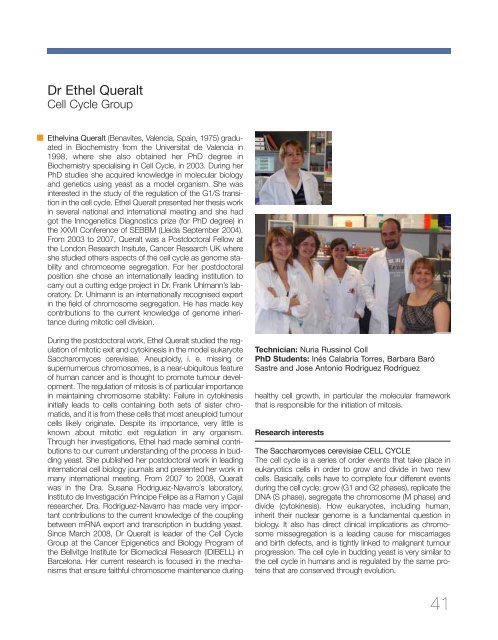PEBC Report - Programa de Epigenética y BiologÃa del Cáncer
PEBC Report - Programa de Epigenética y BiologÃa del Cáncer
PEBC Report - Programa de Epigenética y BiologÃa del Cáncer
Create successful ePaper yourself
Turn your PDF publications into a flip-book with our unique Google optimized e-Paper software.
Dr Ethel Queralt<br />
Cell Cycle Group<br />
Ethelvina Queralt (Benavites, Valencia, Spain, 1975) graduated<br />
in Biochemistry from the Universitat <strong>de</strong> Valencia in<br />
1998, where she also obtained her PhD <strong>de</strong>gree in<br />
Biochemistry specialising in Cell Cycle, in 2003. During her<br />
PhD studies she acquired knowledge in molecular biology<br />
and genetics using yeast as a mo<strong>de</strong>l organism. She was<br />
interested in the study of the regulation of the G1/S transition<br />
in the cell cycle. Ethel Queralt presented her thesis work<br />
in several national and international meeting and she had<br />
got the Innogenetics Diagnostics prize (for PhD <strong>de</strong>gree) in<br />
the XXVII Conference of SEBBM (Lleida September 2004).<br />
From 2003 to 2007, Queralt was a Postdoctoral Fellow at<br />
the London Research Insitute, Cancer Research UK where<br />
she studied others aspects of the cell cycle as genome stability<br />
and chromosome segregation. For her postdoctoral<br />
position she chose an internationally leading institution to<br />
carry out a cutting edge project in Dr. Frank Uhlmann’s laboratory.<br />
Dr. Uhlmann is an internationally recognised expert<br />
in the field of chromosome segregation. He has ma<strong>de</strong> key<br />
contributions to the current knowledge of genome inheritance<br />
during mitotic cell division.<br />
During the postdoctoral work, Ethel Queralt studied the regulation<br />
of mitotic exit and cytokinesis in the mo<strong>de</strong>l eukaryote<br />
Saccharomyces cerevisiae. Aneuploidy, i. e. missing or<br />
supernumerous chromosomes, is a near-ubiquitous feature<br />
of human cancer and is thought to promote tumour <strong>de</strong>velopment.<br />
The regulation of mitosis is of particular importance<br />
in maintaining chromosome stability: Failure in cytokinesis<br />
initially leads to cells containing both sets of sister chromatids,<br />
and it is from these cells that most aneuploid tumour<br />
cells likely originate. Despite its importance, very little is<br />
known about mitotic exit regulation in any organism.<br />
Through her investigations, Ethel had ma<strong>de</strong> seminal contributions<br />
to our current un<strong>de</strong>rstanding of the process in budding<br />
yeast. She published her postdoctoral work in leading<br />
international cell biology journals and presented her work in<br />
many international meeting. From 2007 to 2008, Queralt<br />
was in the Dra. Susana Rodriguez-Navarro´s laboratory,<br />
Instituto <strong>de</strong> Investigación Príncipe Felipe as a Ramon y Cajal<br />
researcher. Dra. Rodriguez-Navarro has ma<strong>de</strong> very important<br />
contributions to the current knowledge of the coupling<br />
between mRNA export and transcription in budding yeast.<br />
Since March 2008, Dr Queralt is lea<strong>de</strong>r of the Cell Cycle<br />
Group at the Cancer Epigenetics and Biology Program of<br />
the Bellvitge Institute for Biomedical Research (IDIBELL) in<br />
Barcelona. Her current research is focused in the mechanisms<br />
that ensure faithful chromosome maintenance during<br />
Technician: Nuria Russinol Coll<br />
PhD Stu<strong>de</strong>nts: Inés Calabria Torres, Barbara Baró<br />
Sastre and Jose Antonio Rodriguez Rodriguez<br />
healthy cell growth, in particular the molecular framework<br />
that is responsible for the initiation of mitosis.<br />
Research interests<br />
The Saccharomyces cerevisiae CELL CYCLE<br />
The cell cycle is a series of or<strong>de</strong>r events that take place in<br />
eukaryotics cells in or<strong>de</strong>r to grow and divi<strong>de</strong> in two new<br />
cells. Basically, cells have to complete four different events<br />
during the cell cycle: grow (G1 and G2 phases), replicate the<br />
DNA (S phase), segregate the chromosome (M phase) and<br />
divi<strong>de</strong> (cytokinesis). How eukaryotes, including human,<br />
inherit their nuclear genome is a fundamental question in<br />
biology. It also has direct clinical implications as chromosome<br />
missegregation is a leading cause for miscarriages<br />
and birth <strong>de</strong>fects, and is tightly linked to malignant tumour<br />
progression. The cell cyle in budding yeast is very similar to<br />
the cell cycle in humans and is regulated by the same proteins<br />
that are conserved through evolution.<br />
41


